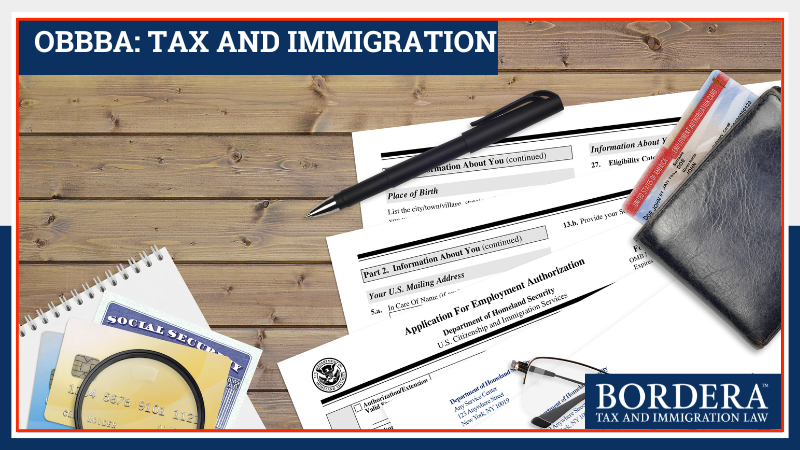
The One Big Beautiful Bill Act introduces major changes to U.S. tax and immigration policy, including higher visa fees and a permanent increase to the Unified Credit for estate and gift taxes. These shifts will affect Canadians investing in the U.S., transferring wealth across borders, or planning to live, study, or work stateside. While the policy aims to raise federal revenue and reshape immigration procedures, it could also strain the labour market and increase economic pressure. At Bordera Tax and Immigration Law, we help Canadians navigate these developments with cross-border tax planning, immigration support, and strategic legal advice. Contact us for expert guidance tailored to your financial goals and U.S. connections.
The One Big Beautiful Bill Act (OBBBA) reflects a clear message from the United States: immigration is going to cost more, and estate tax thresholds will benefit the wealthy. While these changes offer some planning advantages for high-net-worth Canadians with U.S. ties, they also introduce new costs and compliance risks for individuals, families, and businesses pursuing cross-border opportunities. Higher visa fees, shifting enforcement priorities, and a permanently increased Unified Credit for wealth transfers create a complex environment. Canadians must now assess how these fiscal and procedural changes shape everything from family immigration plans to long-term tax strategies. At Bordera, we help you respond with confidence.
The OBBBA introduces increased immigration-related fees that immediately boost federal revenue. These funds support border enforcement and federal programs, and may also help offset future spending, influencing long-term fiscal policy.
The estate and gift tax exemption (Unified Credit) is now locked in at a historically high level, over $13 million USD per individual for 2025 and beyond. Canadians with U.S. property, business interests, or dual citizenship can now transfer more wealth tax-free.
With more generous estate tax rules, Canadians may be more inclined to invest in the U.S., structure cross-border assets, and pass wealth to the next generation. However, the long-term impact could include reduced estate tax revenue, possibly triggering future policy changes.
U.S. tax reform doesn’t happen in isolation. Canadian business owners with U.S. operations must now revisit how they structure entities, time asset transfers, and manage estate planning across both jurisdictions.
The OBBBA introduces a new Visa Integrity Fee and increases in visa processing fees. These costs may discourage small businesses, families, and entrepreneurs from pursuing U.S. entry, reducing legal immigration flows and dampening labour supply.
Higher immigration costs and restrictions are expected to shrink the U.S. labour force over time. This could drive wage inflation, tighten the labour market, and create broader economic ripple effects that influence monetary policy and interest rates.
While immigration supports long-term federal tax revenue, it can strain local services. Redirecting visa revenue to high-immigration areas may help, but if that doesn't happen, new resource allocation debates are likely to emerge.
The U.S. is already facing an aging population and slowing workforce growth. Making immigration more difficult could worsen these trends, affecting innovation, economic capacity, and the overall tax base in the years ahead.
As tax and immigration flows evolve, policymakers may need to adjust benefit eligibility, enforcement priorities, and funding models. Social programs, infrastructure investment, and immigration enforcement will all feel the ripple effects.
With wealthier individuals benefiting from tax exemptions while barriers increase for lower-income immigrants, discussions around fairness, tax contribution, and equitable access will likely intensify, shaping future reforms.
The One Big Beautiful Bill Act may simplify estate planning for some, but it complicates immigration and tax compliance for many. For Canadians with U.S. ties, whether you're investing, expanding a business, managing cross-border wealth, or preparing to enter the U.S. job market; this is a moment to reassess. Bordera Tax and Immigration Law offers strategic guidance tailored to your cross-border needs. Contact us for support with U.S. tax planning, immigration documentation, estate structuring, and compliance strategies that protect your future.
It’s a U.S. law that introduces new immigration fees and raises the estate tax exemption, affecting Canadians with U.S. ties.
It impacts Canadians applying for nonimmigrant visas, such as entrepreneurs, workers, and long-term visitors.
Canadians with U.S. property or dual citizenship can now transfer larger amounts of wealth without triggering U.S. estate taxes. Contact Bordera Tax and Immigration Law to find out more about how you can benefit from the changes the OBBBA is bringing.